标签:virt ice rev inf http string 界面 UNC desktop
上一篇我们讨论了UWP和Desktop Extension间的双向通讯,适用于Desktop Extension中存在用户交互的场景。本篇我们讨论最后一种情况,与前者不同的是,Desktop Extension和UWP保持相同的生命周期,同时规避AppServiceConnection可能被Windows回收的限制,在任意时刻能够反向通知UWP的场景。
首先回顾之前总结的四个场景分类:
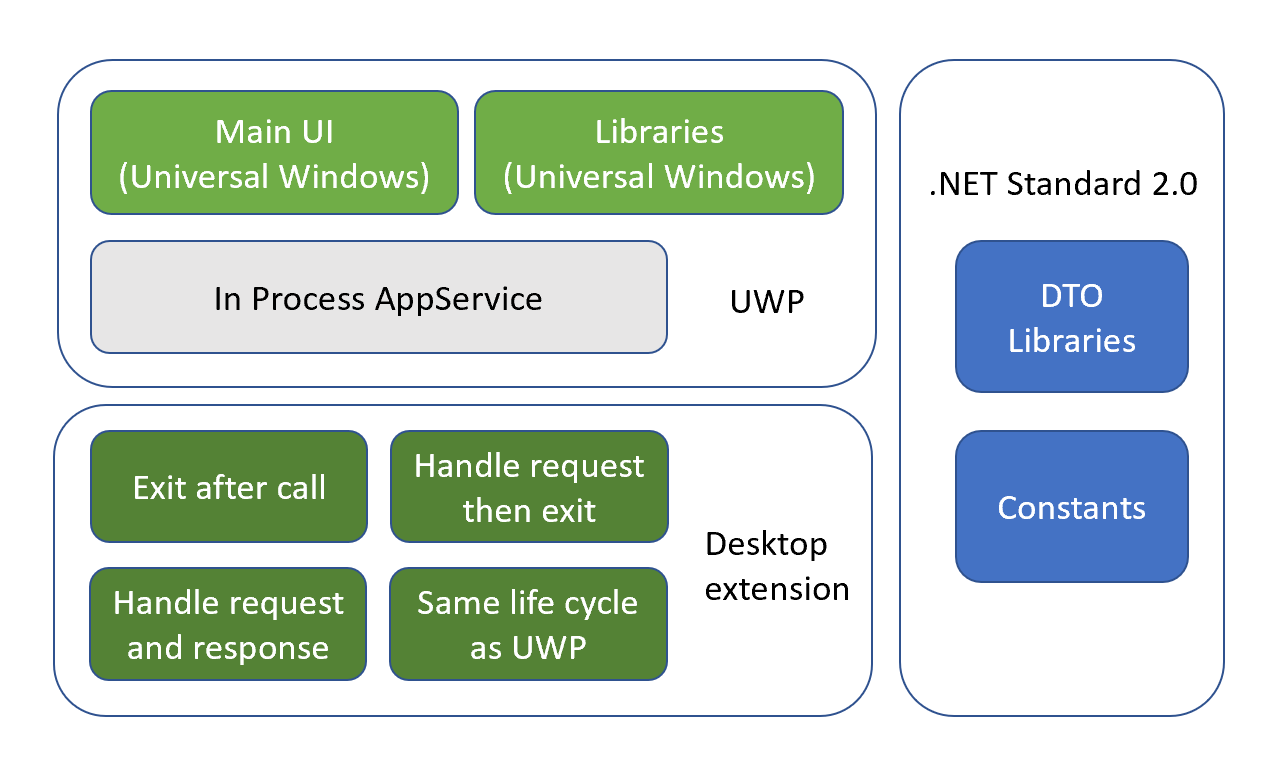
在长生命周期Desktop Extension向UWP的反向通知场景中,有以下特征:
示意图如下:
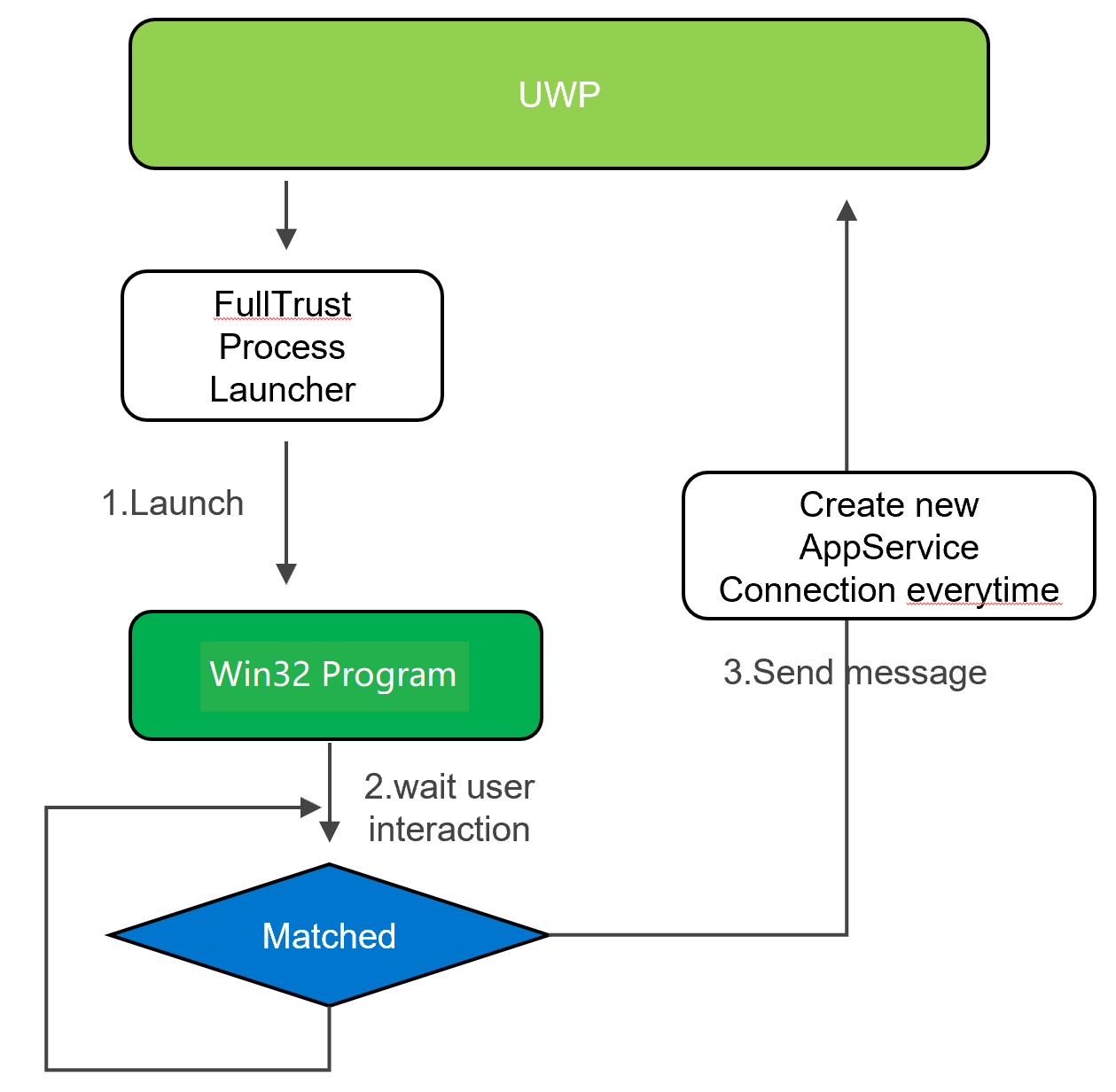
在我们接下来的Sample工程中,将通过Desktop Extension来监听全局键盘事件。在用户按下W, A, S, D四个键时打印在UWP的界面上。其实UWP程序在前台运行的状态下,也是可以捕获键盘事件的。但在最小化的状态下,就只能依靠Desktop Extension来实现了。
在上一篇《2020年的UWP(5)——UWP和Desktop Extension的双向交互》中,我们提到了AppServiceConnection在UWP程序处于最小化时,会被Windows回收导致失去连接。而在长生命周期的Desktop Extension中,我们规避该限制的方式,是在每次从Desktop Extension发起通知时,均创建新的AppConnection对象,这一点非常重要。
整体的工程结构和之前的三篇保持一致,分为ReverseNotification.FrontUWP,ReverseNotification.Desktop以及打包用的ReverseNotification.Package工程。
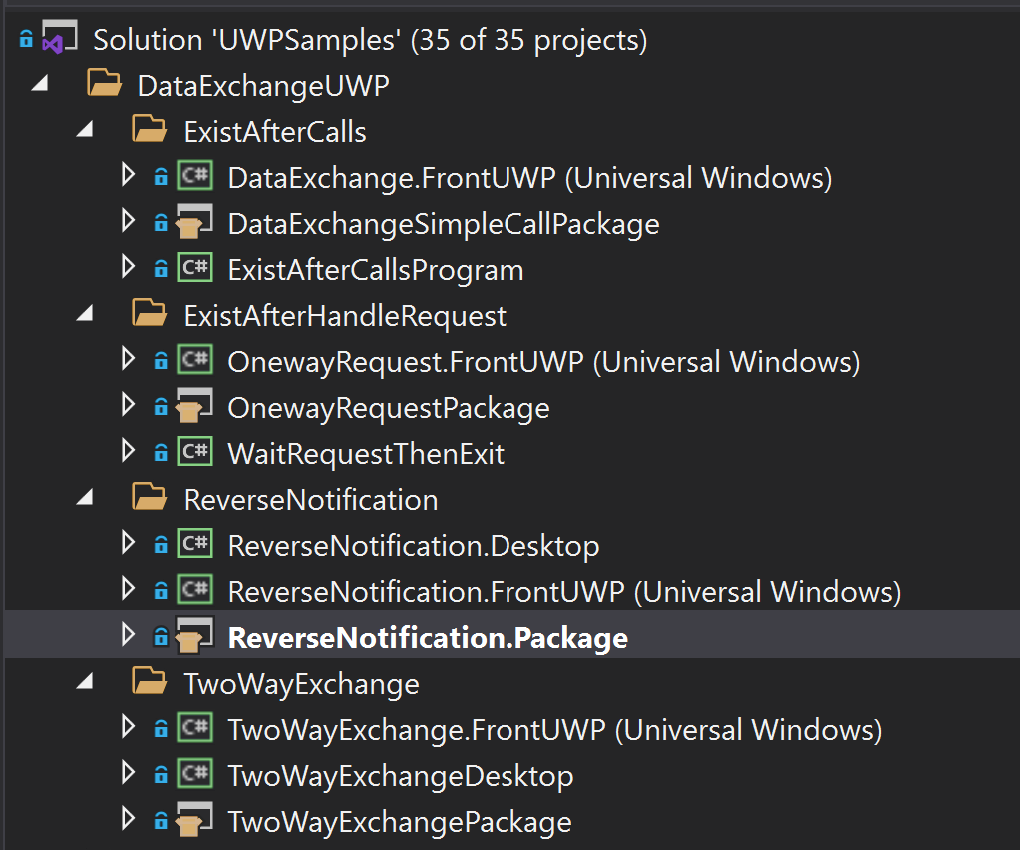
我们先从FrontUWP工程讲起,AppServiceHandler.cs是我创建的帮助Class,用来处理AppServiceConnectoin的Connected和RequestReceived事件。
public void OnBackgroundActivated(AppServiceTriggerDetails details) { Connected?.Invoke(this, new AppServiceConnectionConnectedEventArgs(details.AppServiceConnection)); Connection = details.AppServiceConnection; Connection.RequestReceived += Connection_RequestReceived; } private void Connection_RequestReceived(AppServiceConnection sender, AppServiceRequestReceivedEventArgs args) { RequestReceived?.Invoke(this, args); }
而OnBackgroundActivated事件则是在App.xaml.cs中,通过override UWP Application对象的OnBackgroundActivated方法来触发。这里是AppServiceConnection连接的起点,即源头。
protected override void OnBackgroundActivated(BackgroundActivatedEventArgs args) { base.OnBackgroundActivated(args); if (args.TaskInstance.TriggerDetails is AppServiceTriggerDetails details) { if (details.CallerPackageFamilyName == Package.Current.Id.FamilyName) { var deferral = args.TaskInstance.GetDeferral(); args.TaskInstance.Canceled += (sender, e) => { deferral?.Complete(); }; AppServiceHandler.Instance.OnBackgroundActivated(details); } } }
以上这些在前面几篇中都有提及,这里不再赘述。在UWP工程的MainPage中,我们记录了UWP进程的process id,Desktop Extension段会读取该值,用以检测UWP process的Exit事件,在UWP被关闭时释放资源。同时通过RequestReceived事件来将Desktop Extension反向通知的HotKey的值,通过HotKeyList绑定显示到UWP的界面上。
protected async override void OnNavigatedTo(NavigationEventArgs e) { base.OnNavigatedTo(e); Process process = Process.GetCurrentProcess(); ApplicationData.Current.LocalSettings.Values["processId"] = process.Id; if (ApiInformation.IsApiContractPresent("Windows.ApplicationModel.FullTrustAppContract", 1, 0)) { await FullTrustProcessLauncher.LaunchFullTrustProcessForCurrentAppAsync(); } AppServiceHandler.Instance.RequestReceived += Instance_RequestReceived; } private async void Instance_RequestReceived(object sender, Windows.ApplicationModel.AppService.AppServiceRequestReceivedEventArgs e) { var message = e.Request.Message; if (message.TryGetValue("HotKey", out object keyCode)) { await Dispatcher.RunAsync(Windows.UI.Core.CoreDispatcherPriority.High, () => { HotKeyList.Add(keyCode.ToString()); }); } }
最后不要忘记给FrontUWP工程添加对Windows Desktop Extension for the UWP的引用。
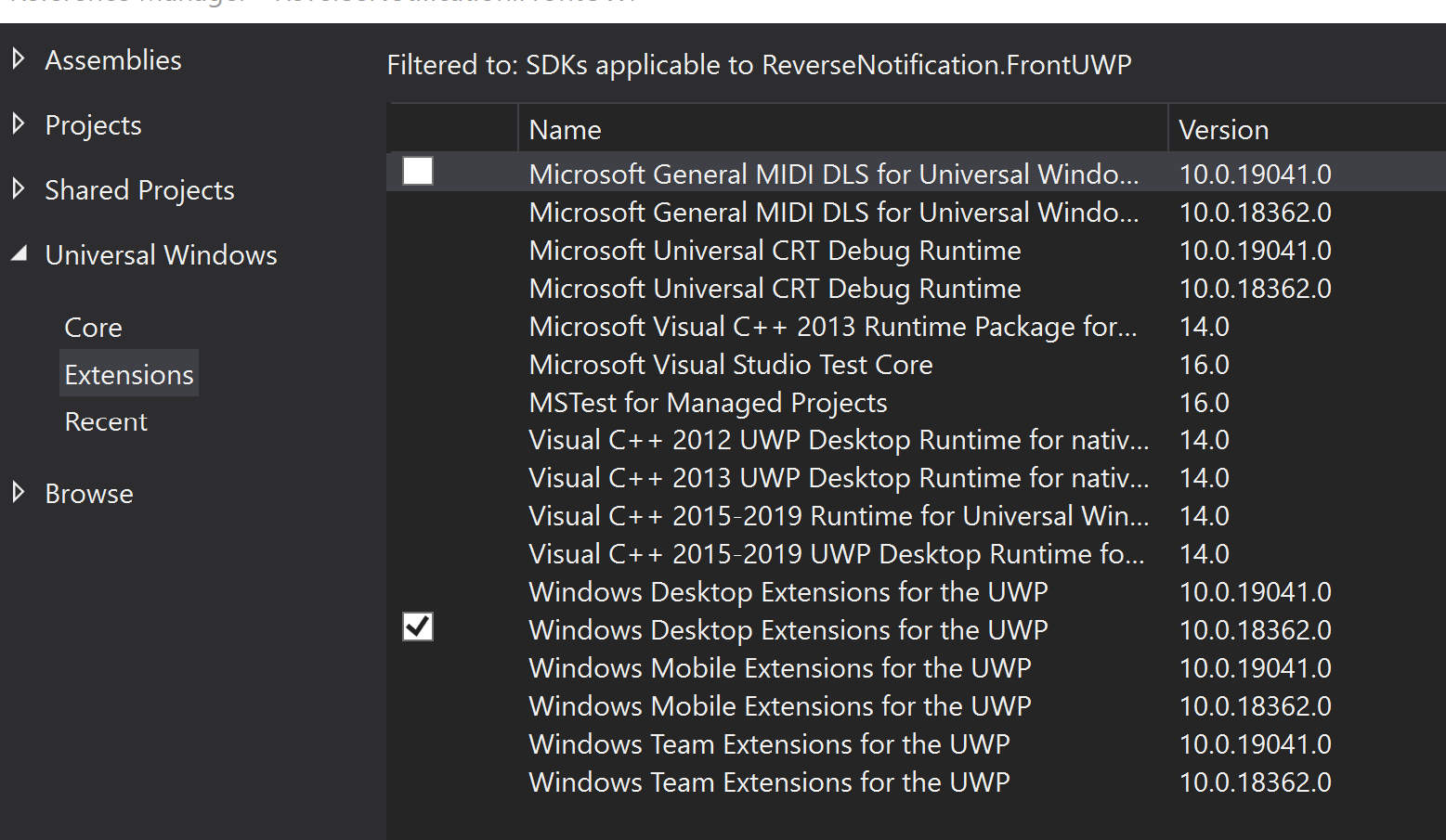
我们转到Desktop这一边,ReverseNotificatio.Desktop是一个WinForms的程序,通过RegisterHotKey这个Win32的API来监听热键。如何实现监听热键我不做过多介绍,具体请参考示例代码。
[DllImport("user32.dll")] public static extern bool RegisterHotKey(IntPtr hWnd, int id, int fsModifiers, int vlc);
同时为了使用AppServiceConnection,添加了对Win10 API的引用,主要是WindowsRuntime和Windows.winmd这两个文件。前者通过Nuget添加,后者请参考《迁移桌面程序到MS Store(4)——桌面程序调用Win10 API》。

我想强调的是,不要在长生命周期的Desktop Extension进程中,去维护一个全局的AppServiceConnection,某软的文档并没有提到细节,但也明确指出AppServiceConnection在UWP进入suspended状态时,可能被释放。我们要做的事情,是在每一次的热键响应事件中,创建新的AppServiceConnection去发送消息。
private async void hotkeys_HotkeyPressed(int ID) { var key = Enum.GetName(typeof(VirtualKey), ID); var message = new ValueSet { { "HotKey", key } }; var connection = new AppServiceConnection { PackageFamilyName = Package.Current.Id.FamilyName, AppServiceName = "ReverseNotificationAppService" }; connection.ServiceClosed += Connection_ServiceClosed; var status = await connection.OpenAsync(); if (status == AppServiceConnectionStatus.Success) { var response = await connection.SendMessageAsync(message); } }
不能保存已创建的AppServiceConnection来重复使用,有时会造成不便。但这也正是我将Desktop Extension分为4个场景的原因,针对不同的用途来创建特定类型的background process。
ReverseNotification.Package作为打包工程,我们需要注意添加对FrontUWP和Desktop的引用。以及编辑Package.appxmanifest文件,提供对AppService和Desktop Extension的支持。
<Application Id="App" Executable="$targetnametoken$.exe" EntryPoint="$targetentrypoint$"> <uap:VisualElements DisplayName="ReverseNotification.Package" Description="ReverseNotification.Package" BackgroundColor="transparent" Square150x150Logo="Images\Square150x150Logo.png" Square44x44Logo="Images\Square44x44Logo.png"> <uap:DefaultTile Wide310x150Logo="Images\Wide310x150Logo.png" /> <uap:SplashScreen Image="Images\SplashScreen.png" /> </uap:VisualElements> <Extensions> <uap:Extension Category="windows.appService"> <uap:AppService Name="ReverseNotificationAppService" /> </uap:Extension> <desktop:Extension Category="windows.fullTrustProcess" Executable="ReverseNotification.Desktop\ReverseNotification.Desktop.exe"/> </Extensions> </Application>
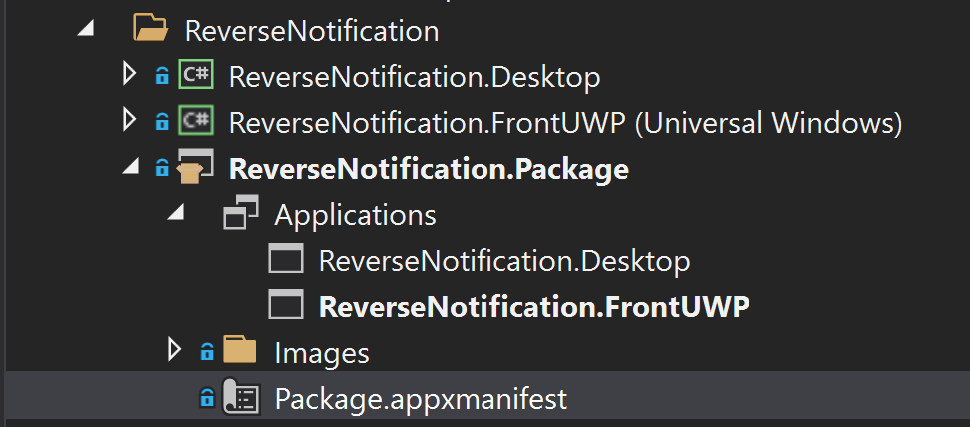
至此对Desktop Extension的一系列讨论告一段落。牵涉的内容较多,很难在一篇文章中解释清楚,我将之前的链接罗列在下方,供各位参考:
《迁移桌面程序到MS Store(9)——APPX With Desktop Extension》对Desktop Extension做了基础介绍。
《2020年的UWP(2)——In Process App Service》详细介绍了如何使用AppService。
《2020年的UWP(3)——UWP和desktop extension的简单交互》介绍了单向的一次性使用场景。
《2020年的UWP(4)——UWP和等待Request的Desktop Extension》background process会有一个较短的生命周期,等待Reqeust执行完成后退出。
《2020年的UWP(5)——UWP和Desktop Extension的双向交互》通常用在同时展现UWP和WPF界面时使用。
Github:
https://github.com/manupstairs/UWPSamples/tree/master/UWPSamples/DataExchangeUWP/ReverseNotification
2021年的UWP(6)——长生命周期Desktop Extension向UWP的反向通知
标签:virt ice rev inf http string 界面 UNC desktop
原文地址:https://www.cnblogs.com/manupstairs/p/14582794.html